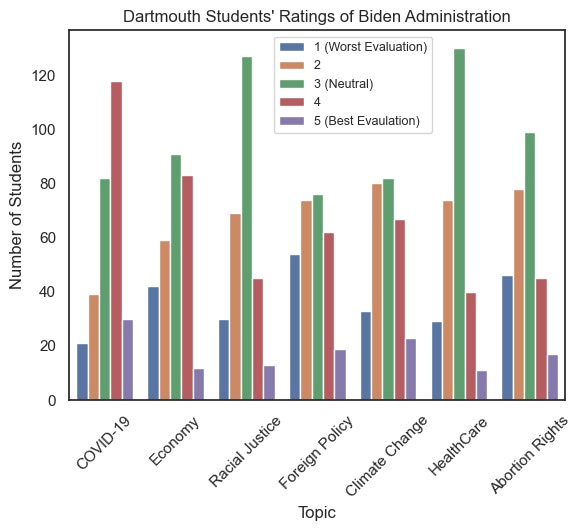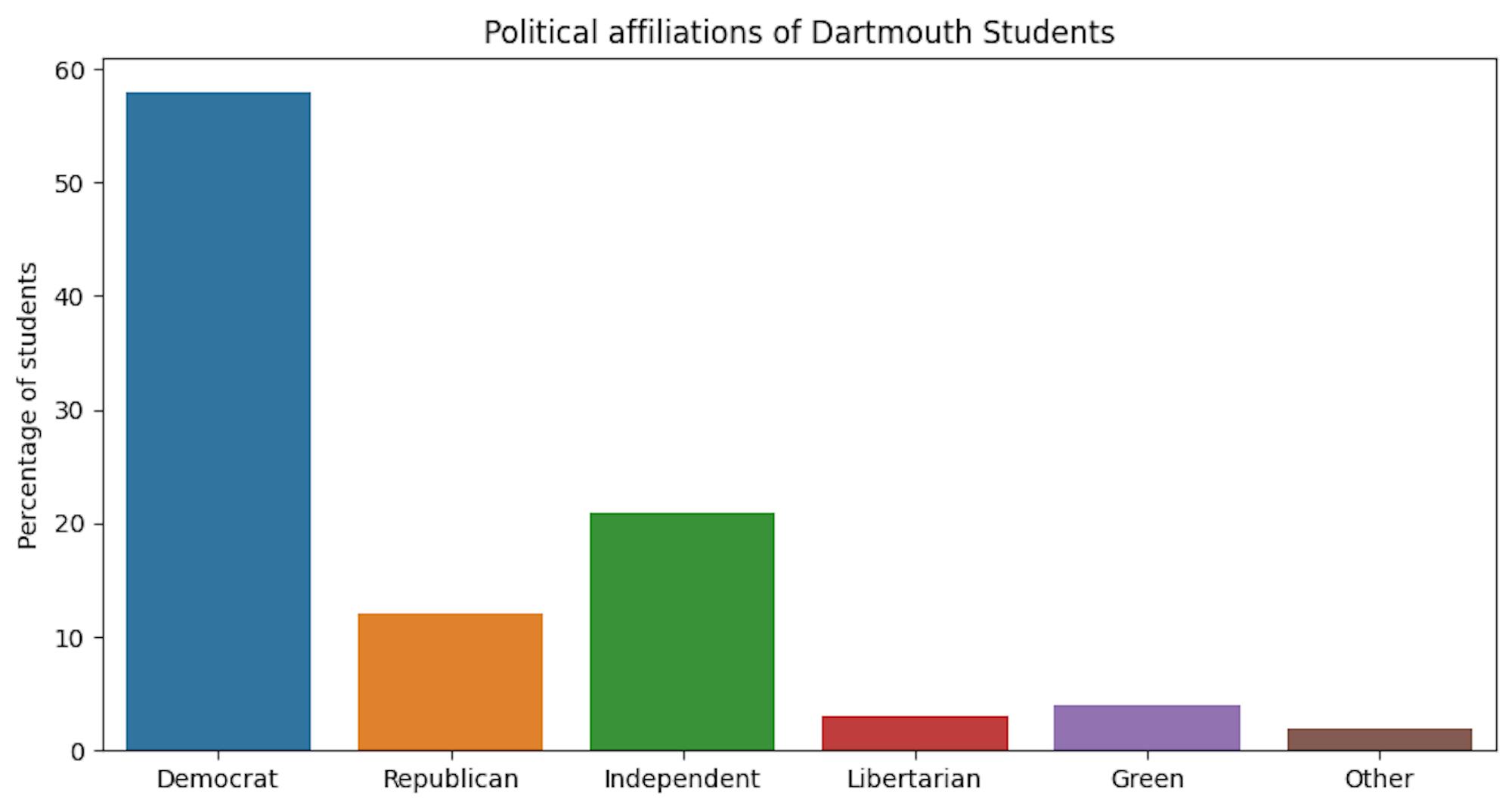With the 2024 New Hampshire presidential primary elections just months away, student discussion surrounding voter turnout, foreign affairs and campaigning has been plentiful. Throughout the past few months, the campus has seen a slew of candidates on their campaign trail, including Asa Hutchinson, Chris Christie and Marianne Williamson. In preparation for the 2024 presidential and state elections, The Dartmouth polled students on their political leanings, stances on the nation’s political climate and views of candidates.
Student voting enthusiasm is up, while support of candidates is down.
Dartmouth students are consistently politically active, with 92% of respondents indicating that they will vote in the 2024 elections, which is 4% higher than The Dartmouth’s 2022 election survey results. Of those who will vote, roughly half are planning to vote in New Hampshire, and the remaining 50% intend to vote through absentee ballots in their home states. 85% of students are very or somewhat likely to vote in the general elections, even if neither candidate resonates with them.
Dartmouth students’ political affiliations have remained consistent with past surveys, where 58% identify themselves as Democrats, 21% as independent and 12% as Republican. The three major affiliations have not deviated by more than five points since 2020.
Students, however, are not all voting simply based on their political affiliations. 56% of respondents indicated that they plan to vote for their respective parties, while 18% indicated that they would vote for their party depending on who wins the primary. The driving reason may be that 54% of students characterize their vote as “against” opposing candidates whereas the minority (41%) of students are voting “for” their preferred candidate. When split by party, 80% of Democrats indicated that they would vote with their party, while 60% of Republicans stated that they would only vote for their party depending on who wins the primary.
Students have mixed opinions about who they prefer to win the GOP presidential nominee. 48% of all students want Nikki Haley to win the nomination, and 12% want Donald Trump to win. Ron DeSantis, Mike Pence and Vivek Ramaswamy each have the support of roughly 7% of respondents. For the 9% of students that want a candidate not mentioned in the survey, Chris Christie was named the most frequently at 26% of the time. When asked about their preferred Democratic nominee, 57% of students responded with Joe Biden, 16% favor Marianne Williamson and 14% support Robert Kennedy Jr. — who has since switched his affiliation from a Democratic candidate to an Independent candidate. Of the 13% of respondents who opted to write in their preferred Democratic nominee, the majority voiced their dissatisfaction with all of the current democratic candidates by writing in comments such as “hopefully someone else runs.” To describe their opinions on the 2024 primaries using one word, the most common adjective was “disappointed,” which was expressed by 7% of respondents, while many others used “worried” and “frustrated.”
Students do not have positive views on the current political climate.

The vast majority of students believe that the American government has room for improvement. A staggering 52% of respondents report being very dissatisfied with the current political climate, and a further 40% of students are somewhat dissatisfied. Only 4% of students hold positive views of the current state of our government. Furthermore, nearly 80% of students believe that the country is moving in the wrong direction.
Highlighted by the historic speaker of the house elections, an overwhelming majority of students identified Congress’s inability to cooperate on important issues — with 97% of students finding Congress to be very or somewhat polarized. Interestingly, in contrast, The Dartmouth’s survey shows that only 9% of respondents have very negative opinions of those who support other parties, while nearly 45% are either indifferent or hold positive views.
Not only is polarization a common critique of our governing body, but also a lack of representation, as highlighted by the desire for the Democratic National Committee to change New Hampshire’s first-in-the-nation primary status. Only 31% of students are extremely or somewhat bothered that New Hampshire is no longer the first DNC primary location, while 32% harbor no opinion, and 36% are unbothered. Furthermore, only 45% of respondents are extremely or somewhat concerned that college students will not be able to vote in the 2024 elections in New Hampshire. However, 77% of surveyed students reported that they do not feel properly represented in Congress.
Climate change is the top voting issue for students, while COVID-19, affirmative action and crime were the least important.

When asked to evaluate the Biden administration from 1 being to the worst to 5 being the best for five out of the six topics — the economy, racial justice, foreign policy, climate change, healthcare and abortion rights — most students gave a rating of 3, which may demonstrate indifference towards our current president. Indifference, however, will not win President Joe Biden support, as 68% of students believe he shouldn’t run for a second term.
As a whole, Dartmouth students are well informed. Two of every three students have either watched or are planning on watching the primary debates — although the debates include neither incumbent president nor the Democratic party. On campus, 27% of students indicated attendance at the Rockefeller Center for Public Policy and the Dartmouth Political Union’s “Path to the Presidency” presidential candidate talks.
55% of respondents also consume news about current events daily while at Dartmouth, and a further 32% consume news updates a few times a week. Of those that consume news, 71% refer to online newspapers, and 19% rely on social media. When provided the opportunity to share news sources that were not included in the survey, many students preferred podcasts for staying up-to-date on current events. However, the Israel-Hamas war began only 10 days after the survey’s initial sending, which may have impacted student response.
With the primary race in full swing, issue voting is important in presidential debates and to secure primary votes. 30% of surveyed students indicated that climate change was most important to them, while both foreign policy and the economy is the greatest concern for 19% of respondents. Only 2% of students indicated that gun rights and immigration were their greatest concerns, and COVID-19, affirmative action and crime were of lowest importance to students. When asked if abortion, inflation, affirmative action and climate change swayed their voting preferences, students largely felt that these topics did not impact their voting intentions or made them support the Democratic candidate. By party affiliation, 18% of Republicans indicated that the issue of abortion has made them more likely to support the Democratic candidate. Affirmative action saw 5% of Democrats more likely to support the Republican candidate. 31% of Republicans were more likely to support the Democratic candidate due to their stance on climate change.
By party affiliation, Democrats rated the three most important issues to their ballot as climate change (37%), foreign policy (16%) and the economy (10%), which is in contrast to last year’s survey — which allowed for multiple responses — and found that climate change, abortion and issues around race, ethnicity and sexual orientation were of most importance to Democrats. Republicans also ranked the economy (44%) and foreign policy (33%) in their top three, with climate change and immigration tied at 8% of student voters as their most important issues. Last year, contrastingly, Republicans listed their most pressing issues as the economy, crime and education.
In light of recent Supreme Court rulings, students hold more consensus in their dissatisfaction in abortion decisions rather than affirmative action.When asked about their support of the recent ruling concerning the constitutionality of affirmative action — Students for Fair Admissions v. Harvard University and Students for Fair Admissions v. University of North Carolina — 32% of Dartmouth students strongly disagreed with this ruling, while roughly 20% of students somewhat disagreed. Still, 20% strongly agree with this ruling. Another important decision made by the Court was Dobbs v. Women’s Health Organization — which nullified federal abortion protections enshrined by Roe v. Wade. 80% of respondents strongly or somewhat disagreed with Dobbs, while 17% were in favor of the decision. Last year’s survey saw greater support for the Dobbs decision at 85%, which may indicate that the decision is of more tolerance to the student body a year later.
Methodology Notes:
From Tuesday, Oct. 17 to Monday, Oct. 30, The Dartmouth fielded an online survey of the Dartmouth student body on their view of the 2023 primary election. The survey was sent out to 4,447 undergraduates through their school email addresses. 479 responses were recorded, resulting in a 10.8% response rate. Using administrative data from the College’s Office of Institutional Research, responses were weighted by gender, class year and race/ethnicity. Weighting was done through cell-based demographic upscaling. Survey results have a margin of error +/- 4.2%.




